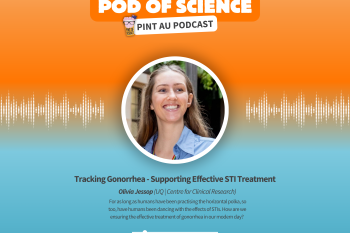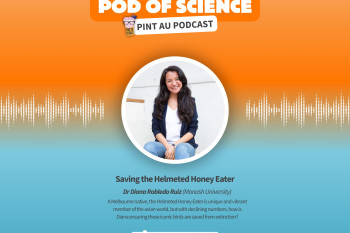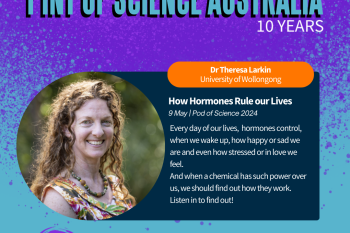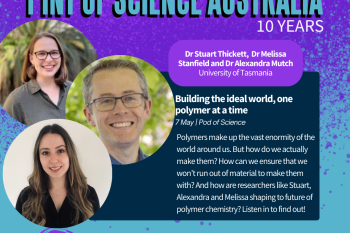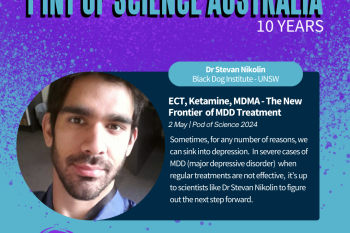© Pint of Science, 2025. All rights reserved.
Antimicrobial resistance is a huge fight that we are already waging. A/Prof Mark Blaskovich and his team are searching for new chemical compounds to help in this fight. He tells us some of the new ways they are hunting and the obstacles they face.
~~
Transcript
Camille Thomson: Welcome to a Pod of Science. Today we're talking with Mark Blaskovich. How are you today Mark?
Mark Blaskovich: I’m very good thank you.
Camille: That's excellent. Perhaps you'd like to tell us in a few words uh a little bit about the work that you do.
Mark: Yeah so I’m basically trying to do research to combat antimicrobial resistance, which are bacteria that are becoming resistant to being killed by the current antibiotics that we have. So I’m looking at trying to develop improved therapeutics to treat drug-resistant infections and improve diagnostics to be able to detect when you actually have a bacterial infection.
Camille: And this antimicrobial resistance is actually a really big thing these days isn't it Mark?
Mark: Yeah so, the World Health Organization you know predicts that by 2050 there are going to be more than 10 million deaths per year caused by drug resistant bacterial infections. Which is you know three times more per year than has been killed by Co-Vid over the last year so it's a definitely a big threat to human health.
Camille: Yeah, that's huge. So what led you into this area of research?
Mark: Well it's kind of been a roundabout pathway. So when I did my PhD, quite a few years ago now, I started out working on natural antimicrobial peptides found in human saliva called the histatins. So that was at the very beginning of my PhD, I then kind of diverted during the rest of my PhD into doing more synthetic organic chemistry and ended up going into medicinal chemistry and worked in the States for a couple biotech companies. And then I came to Australia for a start-up biotech company that was based out at here at UQ. And then those companies some of the projects I was working with on those companies were looking at developing new antibiotics, but it definitely wasn't the main focus of most of the research. But the company I was working for here, we got a drug for a different indication into human testing and the company downsized and became a virtual company. So, I was looking for another opportunity and there's a new research group that started out here within the building that was focused on antibiotics and they hired me initially as a consultant for a grant application for a substantial amount of money from the Wellcome Trust, to develop a new antibiotic idea that they'd been working on. So I helped them out with that and when they successfully got funding they brought me on full time to help drive the program. So it was kind of a circuitous route that that eventually got me here.
Camille: But a fortuitous route as well because you ended up at the right place at the right time.
Mark: Well that's certainly you know it's certainly a very um much more satisfying area to be working in because you know you are fighting something which is a serious threat to human health. And it is becoming more and more reliant upon academic researchers to be doing the heavy lifting and trying to discover new therapeutics because almost all major pharmaceutical company have exited over the last 15 years from discovering new antibiotics. There are a number of biotech smaller biotech companies that are working the area um but financially for them it has been unsuccessful as well. So there are three examples of small biotech companies that successfully managed to develop a new antibiotic that got approved um and within a year of getting approval for their antibiotic they went bankrupt and had to sell off their assets. And that's that just you know it highlights that there's a you know fundamental economic difficulty in developing new antibiotics because they just aren't valued for what they are. I mean they're life-saving drugs, they're one of the few drugs that actually will cure your illness and save your life and have been remarkably effective over the last you know 50 years. And the problem is but basically the, you know the bacteria keep evolving new mechanisms to overcome the antibiotics that we develop. And in the past we were coming up with new antibiotics fast enough to stay ahead of the bacteria but that's no longer happening and the bacteria are winning this this arms race.
Camille: So, what kind of tools do you have in your arsenal to fight this antimicrobial resistance?
Mark: So look we've got a number of different approaches going on because you know you need to you need to try different things. So one of the bigger projects that we've had is trying to discover new chemical types of compounds that are able to kill bacteria. And pharma companies try doing this by screening their large compound collections. But the problem is that antibiotics are different from most other types of drugs in that most antibiotics were originally discovered in nature and these are often quite complex large and three-dimensionally you know interesting structures that are very difficult to chemically synthesize. So what we did was go out to the academic chemical community and see if chemists that are making you know weirdly shaped molecules for a variety of reasons and haven't been interested or haven't had the capacity to test them to see if they have potential to be antibiotics, we offered them free testing if they sent us their compound. And so over the last five years we've tested over 300 000 compounds sent in by 300 and you know 320 academic groups from 47 countries around the world. So it's been remarkably successful at engaging academic chemists who you know have made something already and for them as long as it's easy to do they're more than willing to send it off to be tested to see if it's got you know potential to be a next antibiotic. And you know we've come up with or identified quite a few compounds that do have antimicrobial activity. But then the next step is trying to convert that into developing it as a potential drug and that's where there's you know needs a lot of time a lot of money and we don't have the capacity to do that. So it's sort of reliant on the collaborators to have enough interest to keep advancing it further if it does show some potential.
Camille: So that is kind of the science collaborative process you know one chemist builds a compound you guys test it for various things and someone else has to come along and make it work.
Mark: Yeah and that's to some extent that's kind of going back to how antibiotics were originally discovered. So there are quite a few examples of the original anti… like but Vancoma's Vancomycin was discovered by a soil sample was collected in Borneo and sent off by a missionary in Borneo back to his friend who was working for a company in the states. Because they were fighting together in the war, and you know there weren't legal agreements or contracts or anything they're just working together trying to discover something that would help save lives. And that's part of what our initiative was trying to you know go back to is that collaborative era when you could just work with each other without having to worry about all the legal restrictions of you know sending compounds across different universities and different research groups.
Camille: That is a bit of a hurdle. My next question was going to be what is one of the biggest obstacles to progress in your field and I guess that would be one of them?
Mark: Well I guess yes i guess there are two obstacles really. So one's the bacteria themselves. So they're you know incredibly smart in terms of their ability to rapidly evolve to overcome anything that you throw at them. So pretty much you know whatever therapy you develop the bacteria at some point, because they reproduce so quickly, we'll be able to evolve and mutate and generate new versions of them that are able to overcome that therapy. So it's a matter of you know trying to delay that evolution and that's why there's a lot of effort at public outreach trying to reduce the inappropriate use of existing antibiotics because if you use them more wisely you can reduce the exposure of bacteria to them and reduce the development of resistance. So you know hopefully you can use that new and wonderful drug for a longer period of time. And then the other big obstacle as I mentioned earlier is funding. You know commercially it's incredibly difficult to raise enough money to be able to develop an antibiotic anymore um and because the end point like the cost of developing a new antibiotic is the cost of developing a new anti-cancer compound or a new you know cholesterol lowering drug. But the returns if you make it successfully to market and get approved are vastly different. So you know a new anti-cancer drug you're able to charge you know one or two hundred thousand dollars for a treatment for something which might delay the progression of cancer. For a new antibiotic treatment which you know saves your life um it's difficult to charge more than 10 or 15 000 dollars. So you know if you're a company looking at trying to return some money to your investors it's just a no-brainer where you're going to try you know putting your research dollars into coming up with a better cancer drug. And the other you know sort of compounded by the other problem is that antibiotics generally still work so effectively. So generic antibiotics that that cost you know 10 or 20 dollars for a course of treatment still work 90 percent of the time or 95 percent of the time it you know particularly in in first world countries such as Australia or the States. In you know that the lower middle countries like Pakistan and India that you know really high levels of antibiotic resistance are emerging to begin with and so those countries are the ones that need the new and fancy drugs.
Camille: And of course, they can't afford to pay for them isn't that always the way? So given all this what do you hope that the next generation of researchers in your field will be working on?
Mark: Look so there's always going to be a need for um better antibiotics that are able to, you have an acute infection you're able to give an antibiotic and is able to treat the bacteria. But we need to be working on you know both new preventative measures and so there are some vaccines against a few bacteria that have been very effective. So there's a pneumococcal vaccine and there's a meningococcal vaccine both of which have been you know very effective at saving lives and reducing the need to use antibiotics. The problem is there are so many different types of anti- so many different types of bacterial infections that you know trying to inoculate against all of them would be very very difficult and it's also been remarkably difficult to develop vaccines against some of the most common types of bacteria. And so unlike Co-Vid where they're able to develop a vaccine very very quickly or multiple vaccines. You know they've been trying for 50 years to develop a vaccine against staph aureus and just have not been able to get something that's consistently effective. And then the other thing is trying to come up with different types of therapeutic approaches so things that that don't act the way traditional antibiotics do. And you know there's been a big effort in recent years for um something that was actually worked on for quite a while in eastern Europe during the cold war uh called phage therapy. And these are essentially natural viruses that that kill bacteria. And the main problem with them is that they, so their Achilles heel is that they are very specific for one type of bacteria. So if you don't know what you're infected with you're unable to treat effectively but then you also have to find the specific phage therapy that's appropriate for what you're infected with. And so that sort of leads into the other big improvement that's needed which is more effective diagnostics. So you know detecting they have a bacterial infection is pretty much the same technology that was used 100 years ago. You know you take a swab from the site of infection and then you try to grow up whatever might be infecting you. And so that that growth process takes 24 hours and there's another time frame to identify what species of bacteria it is whether it's resistant to the antibiotics you want to use on it. And so that whole process can take you know 36 to 72 hours before you know exactly what antibiotic you should be using to treat the patient. And so during that time you know you might be trying ineffective antibiotics, the patient might be getting sicker and sicker. So if we're able to come up with a rapid diagnostic which could you know at the point of care you go into the doctor's office he can say yes you have a bacterial infection or no you definitely don't. That would greatly reduce the unnecessary use of antibiotics. Because you know a lot of people go to the doctor they've got a flu or a cold um you know it's a viral infection. Which antibiotics are ineffective against. And either you know they want some medication, and the doctor will just prescribe them an antibiotic or the doctor just to be safe because he's not quite sure maybe it is a bacterial infection you know he'll prescribe an antibiotic anyway. So if you had a diagnostic that could tell you one way or another that would be you know a great way of reducing the unnecessary use of antibiotics and helping to preserve existing antibiotics.
Camille: So that's like attacking it from the other direction.
Mark: Exactly.
Camille: So, taking a step a little bit wider what do you think the greatest challenge for science as a whole is right now?
Mark: I would have to say given recent events over the last year um you know public trust in scientists is probably at an all-time low. And the ability for someone who's done an hour's worth of research on the internet to have as loud a voice and credibility apparently as someone who spent their entire career you know on the subject area um is very concerning and quite disappointing. And you know accompanying that the ability for some governments not to follow you know credible scientific advice in you know the whole handling of Co-Vid is a perfect example. And um some of the events that went on particularly the United States you know. I think Australia has been remarkably good at following advice and listening to what the scientists are saying but you know they're certainly other countries um you know Brazilian states stand up prominently where they ignored a lot of the really credible advice of things they should be doing. And accompanying that you know the general population um you know this disbelief that that it's a real you know it is a real threat or Co-Vid is real and it's being made up by um you know Bill Gates it's just quite alarming.
Camille: And also, that so many people don't have a problem with that that's kind of scary as well.
Mark: No exactly yeah so I think you know in terms of the challenge for science is trying to um make itself more relevant to or more obviously relevant to the general population.
Camille: Which is exactly what Pint of Science is trying to do.
Mark: Exactly and that's exactly why i I want to be involved with Pint of Science. I’m trying to you know make it make aware of some issues of concern to the population and things that scientists are trying to do to help solve them.
Camille: So how did you come to be a part of Pint of Science?
Mark: At first about four years ago, I think I did one of the presentations, of the real-life presentations. And again it's just part of you know part of my belief in the antimicrobial research that I’m doing is that a key part of that is the public outreach and trying to help you know improve public knowledge of antimicrobial resistance and the real danger it poses to human health. And it goes beyond what I think I think it goes far beyond what people generally think of having a you know bacterial infection or resistance infection. If we don't have antibiotics that work anymore, we face a return to a to a pre-antibiotic area where pretty much all modern medical care is going to become very difficult. So you know anti-cancer therapy the patients become immunocompromised they're on antibiotics to prevent them from getting infections and dying. So if we don't have effective antibiotics anti-cancer therapy essentially will no longer be effective. You know people going in for hip and knee replacements well they you know even with antibiotics there's a high prevalence of getting those sites infected but without them basically we won't be able to do elective surgery anymore. And even general surgery for emergency surgery people will die because they get infections that that can't be cured. So all these things we take for granted now from modern medicine you know pretty much almost all of them are underpinned by the use of antibiotics to prevent infections.
Camille: Yeah and people really need to know that. Well Mark it's been really enlightening talking with you I’m so pleased you came on a Pod of Science.
Mark: It's been a pleasure.
Camille: Look forward to having the opportunity to do one of those in real life talks soon. You have been listening to a Pod of Science. Make sure you catch up on all of our episodes on SoundCloud and Spotify and don't forget to support your Pint of Science festival by following us on Facebook, Twitter and Instagram and go on our website to see other ways you can support us by donating today.
